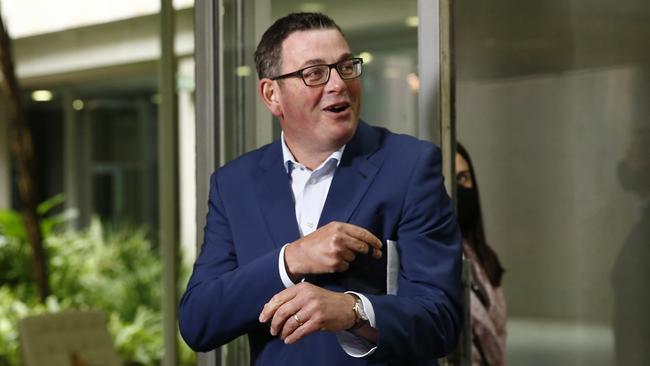Victorian tracing reboot didn’t start until COVID-19 lockdown ended
Key elements of Victoria’s outdated tracing system’s digital upgrade didn’t start until October 26, the end of the state’s 111-day lockdown.

Key elements of Victoria’s outdated and trouble-plagued contact-tracing system’s digital upgrade didn’t start until October 26 — the same day Premier Daniel Andrews announced the end of the state’s 111-day lockdown.
A 30-page government contract, seen by The Weekend Australian, reveals that the Boston Consulting Group was paid $11.48m to design and implement the COVID-19 digital contact-tracing system.
The key contract details emerged as Mr Andrews announced on Friday that Victoria’s COVID restrictions were easing to allow more visitors at home, extra staff to return to work and the relaxation of the rules around wearing masks.
The BCG contract for the COVID-19 Digital Test, Trace, Isolate System Phase 2 ran for just under two months, with a further 30-day warranty period extending the deal to January 23 this year.
The contract was entered into to remove Victoria’s dependency on its existing Public Health Surveillance System, a more rudimentary and manual notifiable diseases system that was implemented in the state in 2012.
The contract reveals that while the project launched on October 26, the formal agreement with the international consulting giant wasn’t officially signed by newly appointed Health Minister Martin Foley until November 25.
As Boston Consulting and Department of Health and Human Services bureaucrats started the frantic work on October 26 to build the digital tracking system, Mr Andrews was announcing a careful road map to relax the state’s draconian second lockdown.
He had revealed in September that the antiquated contact tracing system — which left staff using pen and paper and fax machines — would be digitised.
With the DHHS contact tracing system under fire, the government ordered five public health teams in suburban Melbourne.
On Friday, the DHHS said the contract was part of improving contact tracing.
“Salesforce (the digital system) was implemented in a staged and progressive way to ensure it was safe and practical to switch systems during and after the second wave,” a spokesman said.
According to the document, the contract was “designed to overcome the complications and challenges of the first phase”, as well as to allow “clearer accountabilities and streamlined decision-making processes”.
The lucrative work comprised “development services”, “implementation services” and “professional services”, with all intellectual property rights over the new digital contract tracing system to be retained by BCG.
The contract meant that BCG was free to on-sell the new contract tracing system elsewhere around the world.
The contract allowed the use of just two subcontractors by BCG — Melbourne-based transformation consultancy Contino and customer relationship management technology giant Salesforce.
Other contractual documentation also seen by The Weekend Australian reveals that on the same day, another $430,544 contract was entered into with San Francisco tech company Mulesoft for software associated with the system, as well as a contract worth $3.52m with Salesforce.
That added up to a total cost of just under $15.5m for phase two of the state government’s contract tracing reboot.




To join the conversation, please log in. Don't have an account? Register
Join the conversation, you are commenting as Logout